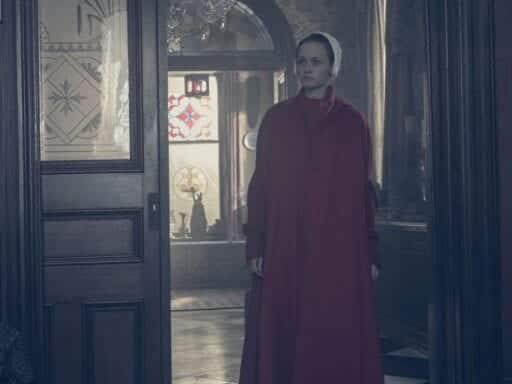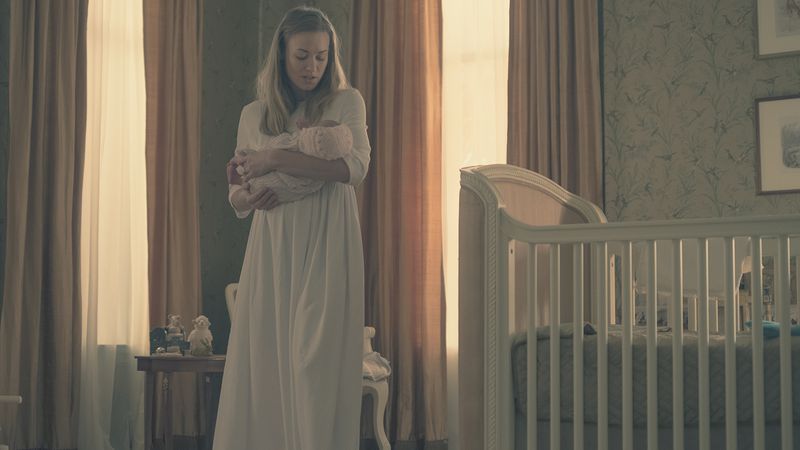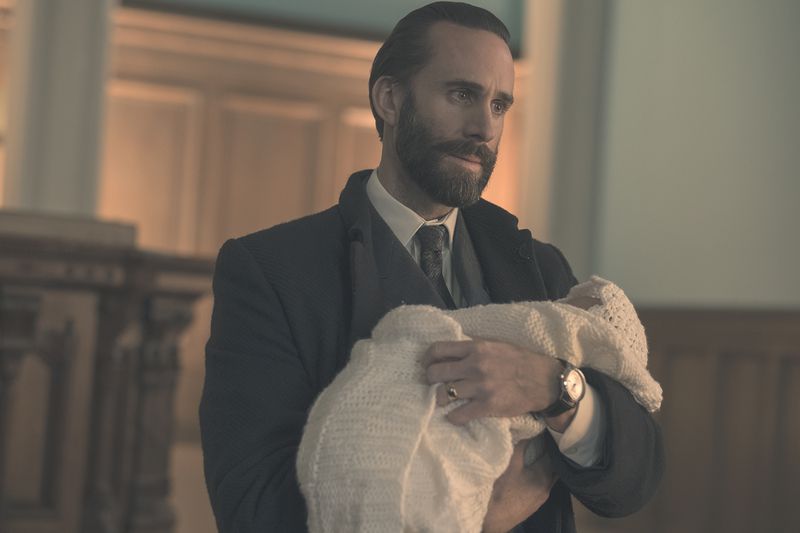
But do we really want the show to be aiming for humor — even dark humor? Plus: This episode feels like a season premiere.
Every week, a few members of the Vox Culture team gather to talk out the latest episode of The Handmaid’s Tale, Hulu’s adaptation of Margaret Atwood’s 1985 novel. This week, critic at large Todd VanDerWerff and staff writer Constance Grady discuss “Postpartum,” the 12th episode of the second season.
Constance Grady: About halfway through this episode of The Handmaid’s Tale, there’s a moment that made me gasp and clap in delight — and then get very, very confused that The Handmaid’s “an endless frozen scream on a TV screen” Tale would ever let me feel such a thing.
It comes when Emily is entering the house of the new Commander she’s been assigned to, Joseph. Played by Bradley Whitford — continuing his recent streak of playing affable-looking white dudes who turn out to be evil — Joseph is the architect of Gilead’s economic policy, but he’s oddly cosmopolitan for a Commander. Like all Commanders, he’s decorated his house with paintings taken from local Boston museums, but he seems to have raided the decedent modern art wing rather than sticking to the straightforward figurative art that Fred and the other Commanders we’ve seen favor. He even plays music, which most of the rest of Gilead seems to abjure.
And then comes the scene in which Joseph pours Emily a drink and starts to ask her about her past. Emily’s playing pious and subservient, but then Joseph asks her how it felt to run over those Guards back in season one and kill them. Wordlessly, Emily picks up her drink and chugs it without breaking eye contact with him.
It’s a goddamn delightful power move of a moment that had me cheering, which is why it throws me so much. What is this Cersei Lannister-like moment of borderline camp doing in the unrelenting bleakness of The Handmaid’s Tale? When did this show become a heightened piece of gothic horror?
The entire Joseph storyline, in fact, is weirdly gothic, from the moment the one-eyed Martha smirks, “Well, you’d better come in then,” at Emily, to the moment Joseph’s mad wife sneaks into Emily’s room to hysterically whisper a secret before Joseph bundles her off to lock her up, while Emily stands there in her shift with her hair loose, pale and thin and wide-eyed. It’s very Jane Eyre in Thornfield Hall with Bertha Rochester ripping up her wedding veil, very Mia Wasikowska in Crimson Peak walking in on her husband having sex with his sister: here is our heroine, pale and fragile and dressed exclusively in a white nightie, and she is trapped in a dark and mysterious house of sexually perverse secrets; have fun.
I love camp, and I love gothic camp especially, but in a show that depends upon a grounded and realistic aesthetic for its horror, gothic camp strikes me as an odd tonal choice. How can you fully feel the horror of Gilead if it’s getting fun and silly and far, far away from the world we live in every day? Gothic horror is for digging into the hidden sexual deviance within us all, not for political allegory.
We’ve been talking for the past few weeks about how this season of The Handmaid’s Tale has had a more baroque tone than the stark horror of season one, and how the new tone feels more sustainable for a TV show that has to keep running and generating story outside the bounds of a novel. But I tend to feel that leaning towards camp is not a productive choice for this show.
How did the plotline strike you, Todd? And was there a jarring difference between what happened to Emily this episode and what happened to poor, doomed Eden?
This episode feels more like a season premiere than a penultimate episode, which is why it struggles
 Hulu
HuluTodd VanDerWerff: I kinda liked the stuff in the Lawrence house, while also finding this one of the season’s weaker episodes (after a string of really strong ones), so maybe the tonal imbalance between it and everything else threw me more than I expected.
I get why it’s there, though, especially if Emily is going to be Lawrence’s Handmaid long-term. I have my doubts this is going to become a thing, given that Whitford’s an in-demand actor who probably doesn’t want to fly up to Toronto every few weeks to hang out in a story that’s already written itself into a corner, but the presence of the story allows for a kind of pressure-release valve from the plunge into darkness that has been everything in this season after June’s first capture way back in episode three.
(Sidebar: You alluded to this, Constance, but with Cabin in the Woods, Get Out, and now this, Whitford has more than earned the unlikely title of “West Wing alum most likely to turn up as a horrifying villain who imagines himself a good dude.” You can imagine Joseph Lawrence telling someone he would have voted for Barack Obama three times in another life.)
One of the things that has made season two so good, but also so harrowing, is that it has by and large eliminated the “you’re just watching a TV show!” reminders that sometimes made season one clumsy. There are fewer “ironic” needle drops, and there are no scenes of the Handmaids walking in formation toward the camera, a hidden army in plain sight. We even have so much less of June’s voiceover, which once provided the kind of sarcastic asides that let the audience remember none of this was really happening.
But without those devices, season two has had to find its pressure-release pleasures where it can find them. Sometimes, those are jarringly enjoyable (Oprah on the radio!), and sometimes, they’re whatever the Lawrence story is trying to do. It’s funny, yes, but to what end, you know? (That said, I do like the glimpse into the lives of power players who signed on to Gilead in its early days because they saw which way the winds were blowing, but who don’t really buy into the country’s religiosity in any real way.)
One of the weird things about “Postpartum” is that it plays much less like a penultimate episode in a season and far more like a premiere. If this were just randomly the season three premiere, it probably wouldn’t feel nearly as jarring, given how many new story arcs it seems to be tossing out. But as episode 12 of 13, it feels like all involved just forgot they had the extra two hours.
The exception, of course, is Eden, who sees her life brought to a too-early end after her flirtation with Isaac is discovered. This is the rare storyline on the show that I both like — for showing how hard it would be to have normal adolescent impulses in Gilead — and kind of dislike, for feeling like an out-of-nowhere attempt to write a character out of the show. Help me decide how I feel about it, Constance.
Was this the most satisfying ending to the Eden storyline?
 Hulu
HuluConstance: We’ve talked a fair amount about what a ticking time bomb of a character Eden is, and I have to admit that having her die in a display of total innocence and purity so that everyone else could learn to feel real bad seems like one of the less interesting ways for her to go off. (She could have turned Nick in for having impure thoughts! She could have become disillusioned with Gilead and become a leader of the resistance!)
That said, Eden’s fate is a good reminder of how impossible it really is to live under Gilead’s rule. Even someone like Eden, who genuinely believes in Gilead’s ideology, who was brought up on it and internalized it and who seems to want nothing more than to be what she understands a good citizen to be, ends up breaking the rules, because it’s just not supportable to do anything else. And given the presence of baby Holly/Nicole, who is going to have to grow up in this place, that reminder is especially striking to the main cast.
The baby is the object of a fair amount of territorial disputes this week, with June longing to nurse and cuddle her child and Serena fiercely declaring that June shouldn’t go anywhere near her. Serena even attempts to nurse the baby herself at one point, only to break down in tears when she doesn’t produce any milk, in a sequence that was either creepy and touching in a good way or creepy and touching in a real bad way depending on how I look at it.
Did that sequence work for you, Todd? And did you buy it when Serena finally handed the baby to June and asked her to nurse?
Todd: I’m adopted, and the show’s approach to these sorts of ideas has always rubbed me the wrong way a little bit. I don’t hold that against the show — after all, it takes place in a dystopic hellscape that emerged from a widespread fertility crisis, so it makes sense that issues of reproductive rights and the rights of biological versus adoptive parents would come up — but there’s a really weird streak of “a baby needs its biological mother” running through this season that gives me pause.
It’s there when Janine gets a chance to nurture baby Angela back to health, and it’s there in the weird struggles with Nicole/Holly in this episode. And to be sure, there’s a real difference between Angela’s situation (where her mother mostly seems to want a baby as a status symbol) and Nicole’s (where Serena Joy really does want to be a mom and seems like she might be an okay one if she could just not be evil for 10 seconds). But I still watch all of this and wonder if I’m meant to be thinking: Can a woman who didn’t physically bear a child not really care for it?
I know. I know! This is meant to be about how Gilead is built atop a gigantic, teetering tower of exploitation and subjugation. It’s a country that forces women to have babies they wouldn’t normally have, then doesn’t even let them raise those children, instead giving them to others who will indoctrinate those kids with the belief system of this terrible new land. It’s about so much beyond my own personal connection to the material.
But it’s still there all the same, and the way it powers the struggles of June and Serena Joy in this episode gives me just a little bit of pause and causes me to decouple from what’s happening just a bit.
That may be why “Postpartum” didn’t work for me as much as the season’s other episodes. It’s one of the few times, watching this show, that I was aware the series’ showrunner is a guy — a guy who’s staffed the show at every level with women who can tell him what he’s getting wrong, but a guy nonetheless.
Or maybe that feeling arrives from the way that the episode ends up accidentally conflating “breastfeeding” with “motherhood” in a way that never feels as convincing as it could. There’s a beauty to the ritualistic way that Serena finally hands Nicole over to June, a kind of private ritual that Gilead could never have created on its own, but there’s also an air of desperation to it, an air of the show trying so hard to find a way to keep June around the Waterford house, because there’s so much intrigue in that space.
But maybe it’s time to leave the Waterford house behind. Maybe it’s time to see what’s going on behind some of Gilead’s other closed doors, ones that might contain worlds as Gothic and campy and weird as the Lawrence house, or might contain still new horrors. “Postpartum” has the feeling, just a bit, of a show spinning its wheels, postponing its next chapter because it’s hoping to play out the string of a season just about done.
Read More
https://cdn.vox-cdn.com/community_logos/52517/voxv.png


